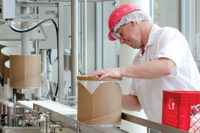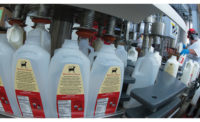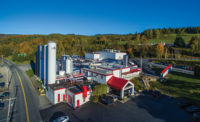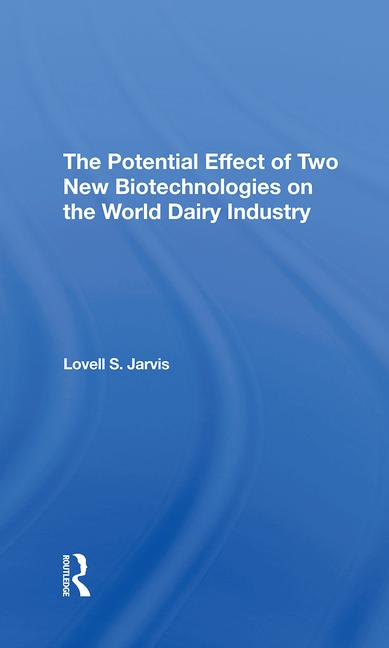Inside Cornell's new creamery

Kirk Nelson applies a label to a 3-gallon ice cream tub coming off the packaging line. Ice cream produced in the creamery is sold in a scoop shop on campus.

Bottling skim milk (in 8-ounce and half-gallon formats) are (from left) Jeff Jebbet, Gary Billings and Kirk Nelson. Besides white and chocolate milk, the creamery bottles orange juice and apple cider. Photo by Robyn Wishna

Gary Billings runs the half gallon filler while Jeff Jebbett cases milk (background). Photo by Robyn Wishna

Cornell fills bulk containers with yogurt. Photo by Robyn Wishna

Milk is shipped out in cases. by Robyn Wishna

Above and right: The new facility houses new tanks for raw product storage, a new separator, HT/ST pasteurizer, homogenizer and other processing equipment. Photo by Jason Huck


Production Manager Tim Barnard verifies piping connections atop a pasteurized tank. Photo by Robyn Wishna










Bavarian Raspberry Fudge and Triple Play Chocolate are just a few of the ice cream flavors in production at Cornell University’s new state-of-the-art dairy processing plant. And since the facility in Ithaca, N.Y., opened last August, not only are students and guests able to order up a cone at the Dairy Bar scoop shop but also they can watch the ice cream production in process through a two-story glass wall facing the campus’ main street and an indoor observational balcony.
“We designed the plant very intentionally and it sends a powerful message of transparency. You see that and it links it back to cows as the starting point, realizing where it’s all really coming from,” said Kathryn J. Boor, the Ronald P. Lynch Dean of the College of Agriculture and Life Sciences. “The plant sends a powerful message to the public about the care with which food is handled.”
The new plant was just one portion of the $106 million renovation project of Stocking Hall. Home to Cornell’s top-ranked Food Science programs, renovation of the 1920s hall (its last major renovation was in the 1960s) also included new food microbiology, food engineering and food chemistry laboratories; new classrooms; a conference center; teaching winery; and offices.
Production processes are run by an automated process control system. The proprietary software “means we can stream our HMI control software into classrooms for real-time, read-only viewing of current data and processes,” said Jason R. Huck, general manager, dairy operations.
A Cornell grad himself — Huck completed a master’s degree in Food Science/Dairy Microbiology — he has been the GM since 2008. His master’s thesis focused on fluid milk shelf-life extension.
“Ultimately, developing a better understanding of sporeforming bacteria in fluid milk systems, from farm to package, through molecular typing methods, our research has helped to shape how we focus on quality and processing in the fluid milk industry today,” he explained.
New processing equipment
The new facility houses new tanks for raw product storage, batching, pasteurized product storage, fermentation and vat pasteurization. There is also a new separator, batching system,
HT/ST pasteurizer, homogenizer, ice cream freezer center, cultured products room and packaging equipment, fluid bottling handling and packaging equipment, and cold storage rooms. The new facility has an increase of more than 170% in storage volume. A new clean-in-place system reduces the number of parts that need to be hand-washed from 280 to six.
In addition to ice cream and other frozen desserts, the plant also produces fluid milk, juice, juice beverages, yogurt, pudding and Cheddar cheese. Fermented dairy beverages, frozen yogurt, low-fat ice cream, sour cream and yogurt-based dressings are in the R&D track. All products are sold on the Ithaca campus, but Huck is quick to point out that manufacturing dairy products for sale is not the plant’s primary mission. Teaching, research and extension are the focus.
“With the surge in the dairy processing sector in New York state, especially in the cultured products and artisan markets, the increased need for a dairy center to support hands-on training, research partnerships as well as to train future dairy leaders has grown,” said Huck.
Industry partners of the project are TIC Gums, Whitemarsh, Md.; The International Food Network, Ithaca; and PepsiCo., Purchase, N.Y. In June 2013, the grocery chain Wegmans, Rochester, N.Y., announced that it was providing $360,000 in funding for a three-year pilot program at the university that includes the hire of an artisan cheese extension associate position in the CALS Department of Food Science.
In October, New Berlin, N.Y.-based Greek yogurt maker Chobani announced a $1.5 million gift to support research and workforce training in dairy quality.
“From providing technical support to new dairy processors, to consulting clients on new products and processes to training new industry operators and managers on dairy foods sanitation, our Cornell University dairy processing plant is a key industry resource,” Huck added.
Milk is just around the corner
Procuring raw milk from the university’s teaching farm (a little more than a mile from the dairy plant) “gives us control of the quality and safety from farm to table as well as an ideal system for teaching and research,” Huck said.
“The new plant offers vastly improved opportunities for training as it represents the complete layout and a set-up that is comparable to large operations,” said Professor Martin Wiedmann, who leads the dairy extension program. “It thus provides an opportunity to better train people who work in large commercial facilities. This opportunity contributes to economic growth and expansion of the dairy industry in New York.”
The renovation expands training for inspectors from the New York Department of Agriculture and Markets, as well as state-authorized certified milk inspectors. Plus it allows faculty members to compete for more food safety, quality and processing research funds from federal and state agencies and private companies.
Currently, working in the dairy processing plant is not a course or undergraduate degree requirement, but students are participating in hands-on learning activities in a variety of ways, from learning to develop an environmental sampling program to better understanding unit process operations in real time. And Huck notes that given the increased focus on dairy foods in the state, faculty has been working on the development of a dairy foods undergraduate program.
Hands-on learning
Adriane Gless, a senior in the Food Science program, interns at the plant.
“My roles are diverse,” she said. “Some days I help with production and monitor the bottling equipment and other days I lead tours in the observation gallery in an effort to teach the Cornell community about the facility and what we do. Being from Colorado I knew very little about dairy foods production, but in just one semester I have learned so much from the Dairy Plant team and my hands-on experience within the facility.”
After graduation in May, Gless said she plans to build a career as a food scientist in the product development or manufacturing role.
“Working at the plant has helped me to understand the many facets of food — particularly dairy food — production,” she said. “And I now have a greater appreciation for everyone working in this industry that I aim to become a part of.”
A long-time dairy teaching partnership is an end-of-the-year project in Cornell’s introductory food science class where students are divided into teams and work to develop an ice cream flavor. Last year, the class worked with senior extension associate Rob Ralyea in the lab and pilot plant to learn technical aspects of commercial ice cream processing. Cookie Dough Remodel was last year’s winner, a flavor that will now be served at the Dairy Bar. The ice cream has a dark chocolate base, sugar cookie pieces and white chocolate chips.
The plant also provides hands-on learning even for those students not looking to make a career in the dairy industry. Huck recently worked with a team of Systems Engineering students participating in a Six-Sigma for the Design and Operation of Reliable Systems class on a group project in which they were asked to analyze the manufacturing improvements that likely resulted from the Dairy Plant renovation project.
“Although only a small project,” he said, “these engineering undergraduates were given a hands-on introduction to dairy foods processing, from the engineering design of the new processing system to manufacturing records and data collection.”
“The project allowed us to utilize six-sigma analysis in a real-world application and receive a certification,” explained Violeta Crow, a student in the Masters of Engineering graduate program. “Familiarity with this optimization process gives us a competitive edge in the professional world.”
Not only will those in upstate New York benefit from the new facility, but look for it to have an impact for the entire industry as it leads quality and safety standards. The Cornell Chronicle reported in September that Sen. Charles Schumer (D-N.Y.) visited the campus and “promised to put his political muscle behind the effort to give Cornell official federal recognition for its efforts by lobbying leaders of the U.S. Department of Agriculture and the U.S. Food and Drug Administration.”
“I see the new facility as a nucleation point for growth and innovation in the dairy industry in New York and beyond,” Wiedmann said. “This is a tribute to the longstanding and unwavering support by the dairy farmers of New York state through the dairy checkoff dollars. This facility will help upstate New York develop into one of the key dairy and food innovation regions in the world.”
Looking for a reprint of this article?
From high-res PDFs to custom plaques, order your copy today!















